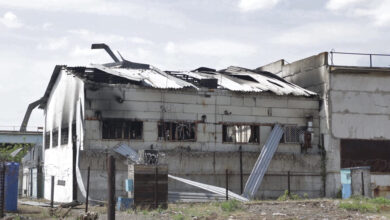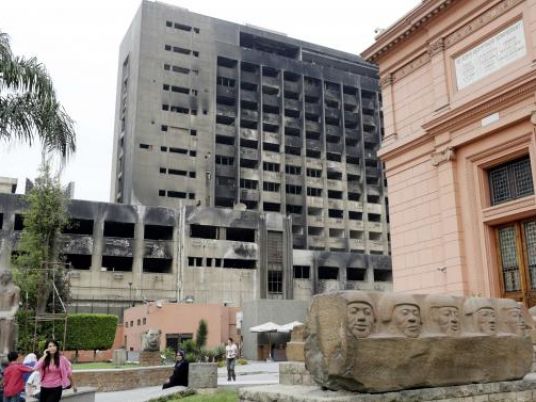In the run-up to Egypt’s first post-Hosni Mubarak parliamentary elections, many feared the continued dominance of former regime remnants, owing to their experience in previous elections and their history of co-opting voters. It turns out they were afraid of nothing.
The first round of parliamentary elections, which took place last week in nine governorates, witnessed a historic turnout of 62 percent of registered voters, and the second and third rounds are scheduled to end by January of next year.
Eight parties led by former members of the now-dissolved National Democratic Party (NDP) are running in the parliamentary elections, but so far their lists placed near the bottom and their single-winner candidates failed to win any seats.
“Thank God we were able to isolate old-regime remnants and enforce the popular political isolation law without the need for the ruling military council and its laws,” reads a statement on the Facebook group Catch the Remnants, formed by a group of young people to help voters identify former corrupt NDP members.
The NDP won about 86 percent of parliamentary seats in 2010, although the Supreme Administrative Court ruled the elections void in December 2010 due to vote-rigging. In spite of this ruling, the parliament was not dissolved until 13 February, two days after former President Hosni Mubarak stepped down.
The low number of votes these parties received came as a surprise not only to revolutionaries but also to the NDP remnants themselves.
Mohamed Anwar, secretary general of the Union Party, which was founded by former NDP member Hossam Badrawy, told Al-Masry Al-Youm that the first round preliminary results were disappointing compared to its expectations.
“The high voter turnout completely changed the map of the voting blocs, which meant that the number of votes we were guaranteed ended up as a small percentage of the total number of votes,” said Anwar.
The Union Party, founded in September, ran four lists in three governorates and two single-winner candidates, none of whom won. Their list ranked fifth in Kafr al-Sheikh and 11th in Alexandria.
Ironically enough, while the NDP had a history of rigging elections and bribing voters, these NDP offshoots today accuse the Muslim Brotherhood’s Freedom and Justice Party (FJP) and the Egyptian Bloc, a liberal electoral coalition led by the Free Egyptians Party, of the same practices.
“All secular forces were affected by the manipulation that took place during the counting of votes in favor of the FJP,” said Mahmoud Nafady, secretary general of Freedom Party in Cairo. The party is presided over by Mamdouh Mohamed Mahmoud, another former NDP member.
Nafady, who is a parliamentary candidate, tells Al-Masry Al-Youm that a candidate from his party found 20 boxes filled with ballots left uncounted in one polling station and has since filed a lawsuit. He also accuses the FJP of stuffing ballot boxes during the counting process.
The Freedom Party ran eight lists in the first round and 14 single-winner candidates; however, only one candidate is scheduled for the run-off election, in Luxor, and two lists ranked third and fourth in Fayoum.
The newly-formed party is known to have a strong backing in Upper Egypt's constituencies.
Nafady also attributes the party’s weak performance to a lack of coordination between the list-based candidates and poor financial resources compared to the excessive spending by the FJP and Free Egyptians Party, which is led by billionaire Naguib Sawiris.
“Campaigns were in some places nonexistent because some candidates expected the party to sponsor them financially but that didn’t happen,” added Nafady.
In order to counter the Islamist dominance witnessed in the first round, the parliamentary hopeful said that his party will shift its campaign rhetoric.
“We will ask people if they want a sweeping majority dictatorship parliament or a consensus one that represents all spectrums,” said Nafady.
Salah Hasaballah, a founding member of the Egyptian Citizen Party, also denounced the FJP and Egyptian Bloc's violations of the parliamentary elections law by distributing campaign material outside and inside polling stations, as well as the silence of the High Elections Commission (HEC) over these reported breaches.
“It seems we abided by the elections law in the first round more than we should have, by halting our campaign 48 hours before elections day. Therefore in the next rounds, we will distribute our material outside polling stations just like other parties, since the law isn’t being enforced,” said Hasaballah.
According to Article 3 of the High Elections Commission's lists of regulations, parties must stop campaigning two days before the voting day in each election round.
The Egyptian Citizen Party’s lists also placed low in most first round governorates and it might win about three seats maximum, said Hasaballah.
Hasaballah, who has previously admitted that 15 percent of his party’s founders are former NDP members, also condemns the appeals to religion made by the Muslim Brotherhood and the Coptic Church to encourage constituents to vote for the FJP and Egyptian Bloc, respectively.
“The party lost many votes over this polarization because some voters, both Muslim and Christian, thought they had to vote for either coalition in order to support their religion,” he said. “Minds have disappeared and religious beliefs have ruled in elections.”
Reda Saqr, a single-winner candidate and founding member of the Union Party, also denounced the practices of the FJP and Egyptian Bloc.
“We reject these violations. We thought this ideology’s time has gone and there is a new Egypt since the revolution,” said Saqr.
Saqr attributed this failure to his party's lack of financial resources compared to larger parties, time constraints and the geographical expansion of some constituencies.
“Our human and financial resources don’t allow us to have booths and representatives by every polling station in every constituency like the FJP,” said Saqr.
Although Saqr managed Badrawy’s successful parliamentary election campaign back in 1999 in the constituency he ran in this time, his experience didn’t help him win, as he was not able to reach out to voters in two whole neighborhoods, he said.
“We have to reconsider our strategies and calculations according to the new reality, however it would be hard to make drastic changes in the time being,” said Saqr.
However, in the long term, he believes, secular parties have to form strong coalitions to confront the religious-based ones.
Nafady added, “We didn’t make electoral coalitions, because some parties believed that such a coalition would prove accusations of us being remnants of the old regime united against other parties.”




